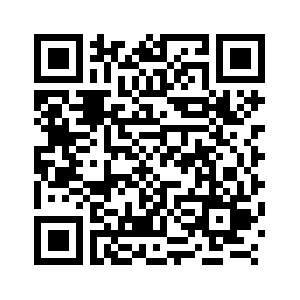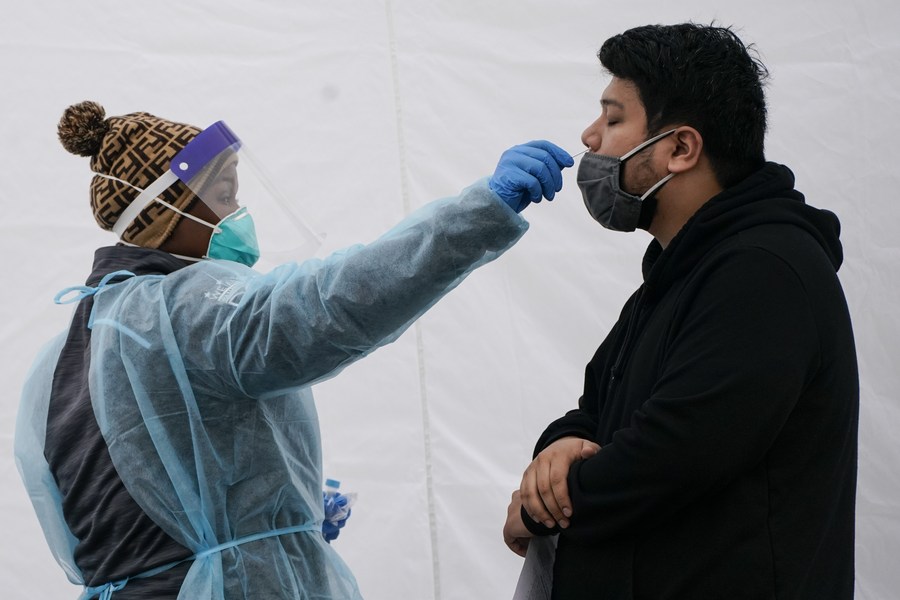
A man receives COVID-19 test in Washington, D.C., the United States, on Dec. 30, 2021. (Photo by Ting Shen/Xinhua)
The rapidly spreading Omicron variant is hitting businesses at a time when consumers' demand for products and services has surged, and many companies already are struggling with staffing and supply-chain challenges.
NEW YORK, Jan. 3 (Xinhua) -- Entering the third year of the COVID-19 pandemic, the United States finds itself still trapped in chaos with variant surge, impaired businesses as well as flight and train cancellations, while there have surfaced some unexpected achievements as people try to tame the scourge with their wisdom and determination.
"The pandemic brought seismic changes," reported The New York Times (NYT) on Monday. Out of the tragic deaths and hospitalizations, "from new forms of medicine to less wasteful business practices, many have adapted to COVID-19 in ways that have improved them, and society."
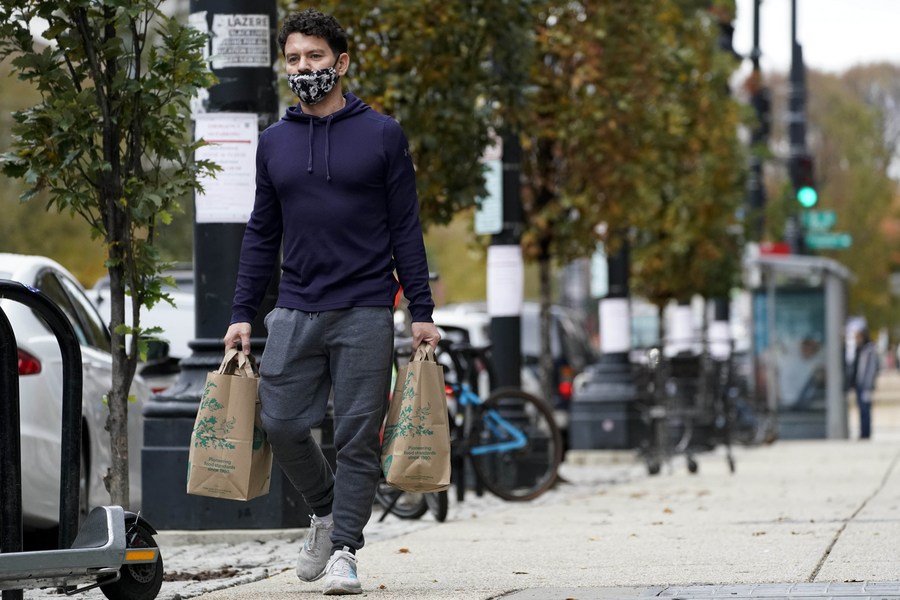
A man walks on a street after shopping groceries at a supermarket in Washington, D.C., the United States, on Nov. 12, 2021. (Photo by Ting Shen/Xinhua)
BUSINESSES DAMAGED
"The rapid spread of COVID-19's Omicron variant is weighing on U.S. businesses, keeping more workers home sick or quarantined and leading some companies to cut services and reduce hours," reported The Wall Street Journal (WSJ) on Monday.
The rise of U.S. COVID-19 infections to record levels in recent days has resulted in thousands of canceled flights, prompted retailers to train available employees on new jobs or close some stores altogether, companies were quoted as saying.
"The rapidly spreading Omicron variant is hitting businesses at a time when consumers' demand for products and services has surged, and many companies already are struggling with staffing and supply-chain challenges," said the report.
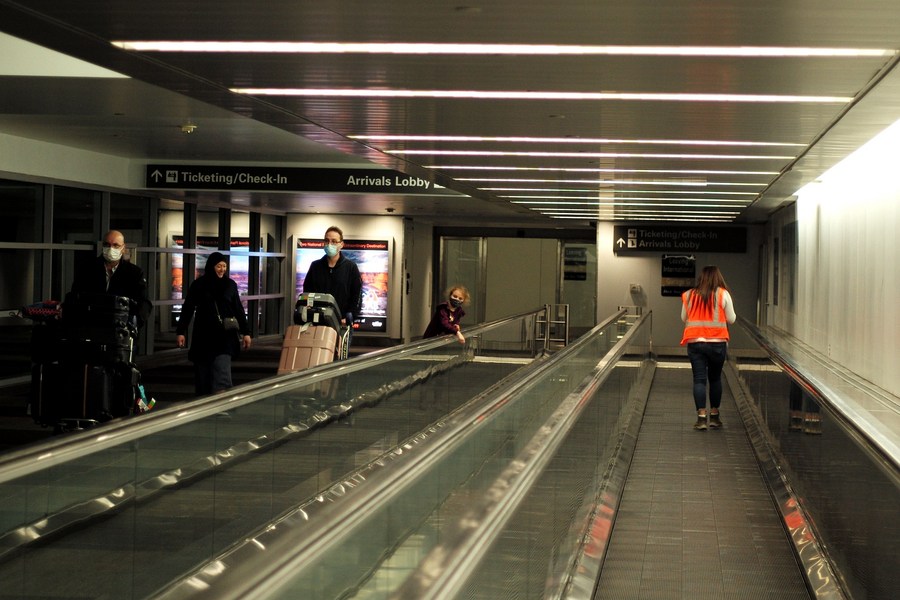
Travellers arrive at the San Francisco International Airport in San Francisco, California, the United States, on Dec. 1, 2021. (Xinhua/Wu Xiaoling)
AIRLINES WEAKENED
Airlines over the weekend canceled thousands of flights, capping a week in which carriers scrapped more than 1,000 flights each day, according to flight-tracker FlightAware. Nearly 1,500 Monday flights were canceled as of late Sunday.
In addition to snowstorms that snarled up airports in the Pacific Northwest and Midwest, airlines said that rising COVID-19 infections among crew members hampered their abilities to staff flights while holiday travel was rebounding from 2020 levels.
A case in point is New York-based JetBlue, which trimmed its flight schedule through mid-January as more crew members have contracted the virus, a problem that has become "harder to navigate than when the pandemic first emerged in early 2020," said WSJ in its report.
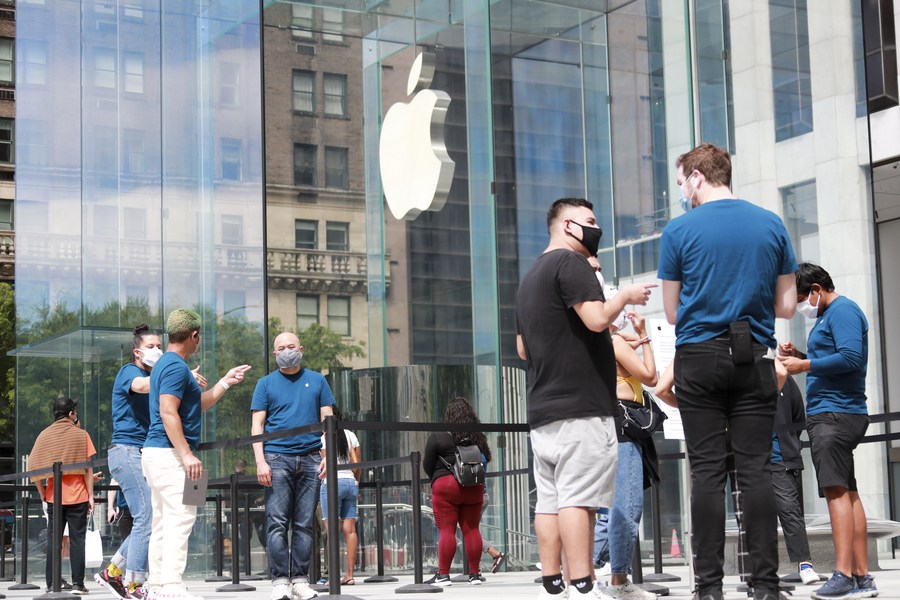
Staff workers serve customers outside an Apple store on Fifth Avenue of New York City, the United States, June 17, 2020. (Xinhua/Wang Ying)
SHOPS AFFECTED
Supermarket operators said that they anticipate the Omicron variant's spread will drive increased absences among cashiers, stockers and other employees in the days ahead, deepening staffing problems the grocery sector has faced for months.
Increasing infections have led some retailers to temporarily close stores, such as Apple Inc., which limited access to New York City-area locations, including its iconic Fifth Avenue flagship. Apple closed all of its stores to in-person shoppers in New York City on Dec. 27.
Toyota Motor Corp., with 48,000 people across over 20 facilities in the country, has generally been carrying extra staff in anticipation that a certain number of workers might be quarantined. The company can test workers on site and has been tracking cases.
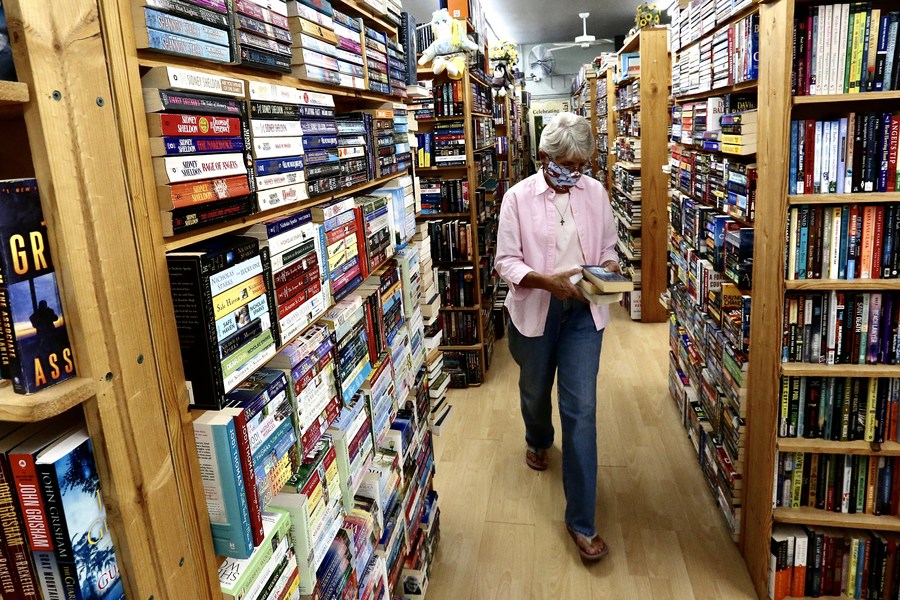
Karen Kropp, owner of The Book Rack bookshop in Arcadia, works at the bookshop in Los Angeles County, the United States, on Oct. 13, 2020. (Xinhua)
SOCIAL IMPROVEMENTS
Book sales rose during the pandemic's first year of lockdown, and today, reading habits seem to have stuck: from January to November 2021, sales of consumer books increased 13 percent over the same period the year before, according to the Association of American Publishers.
A furloughed restaurant kitchen manager powered through "1984," "Macbeth," "A Raisin in the Sun" and more during the pandemic; now back at work, he kept the habit, reported NYT. In correspondence with the surging public choice, at least 172 new independent bookstores opened in 2021, said the American Booksellers Association.
Meanwhile, the report noted that "for some people with disabilities, cultural shifts the pandemic forced, like flexible and remote work, for which they long advocated, have already improved their lives."
The employment rate for disabled people is currently at an all-time high, though still profoundly below that of people without disabilities, according to the non-profit Kessler Foundation, which tracks data that relates to people with disabilities.
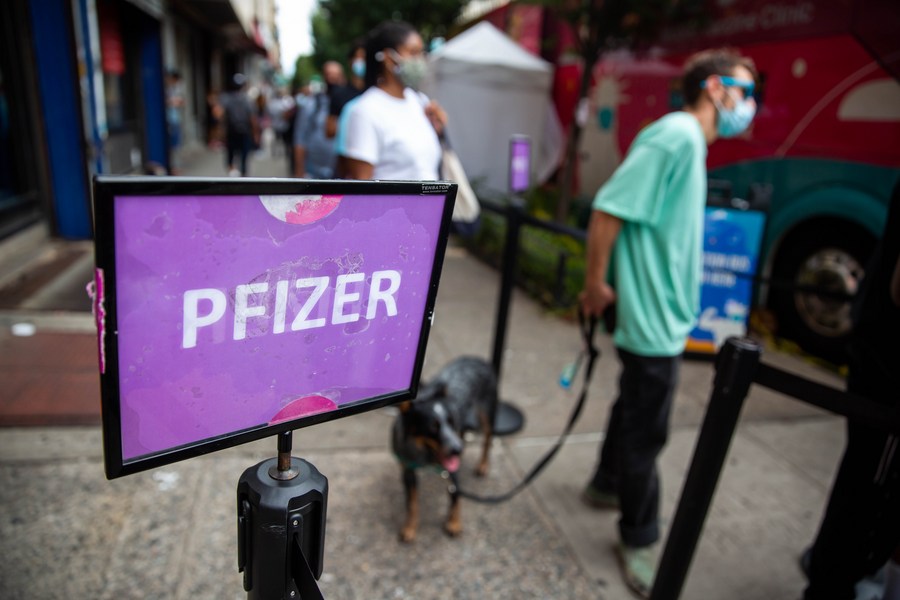
People wait in line to receive the Pfizer/BioNTech COVID-19 vaccine at a mobile vaccine clinic in the Brooklyn borough of New York, United States, Aug. 23, 2021. (Photo by Michael Nagle/Xinhua)
MEDICAL INNOVATIONS
Of course, the first and foremost achievements out of the lasting pandemic are the vaccines and pills invented to treat the coronavirus. From Pfizer to Moderna, a range of basic shots, boosters and tablets have pushed the medical frontier further around.
The latest drug news is that the U.S. Food and Drug Administration (FDA) on Monday cleared the Pfizer-BioNTech COVID-19 booster dose for children ages 12 to 15, empowering more people against the virus.
"In the field of medicine, the onslaught of the sick stretched thin hospitals and burned out many medical professionals, but it has also revolutionized some parts of the field," said the NYT report.
One example is that telemedicine, which officials greatly expanded permissions during the pandemic, made getting care easier for many people.
"In any big tragedy, there is always a positive side," Rita A. Manfredi, a clinical professor at the George Washington University School of Medicine and Health Sciences, was quoted as saying. "The negative side is obvious, but there is always a positive side." ■
